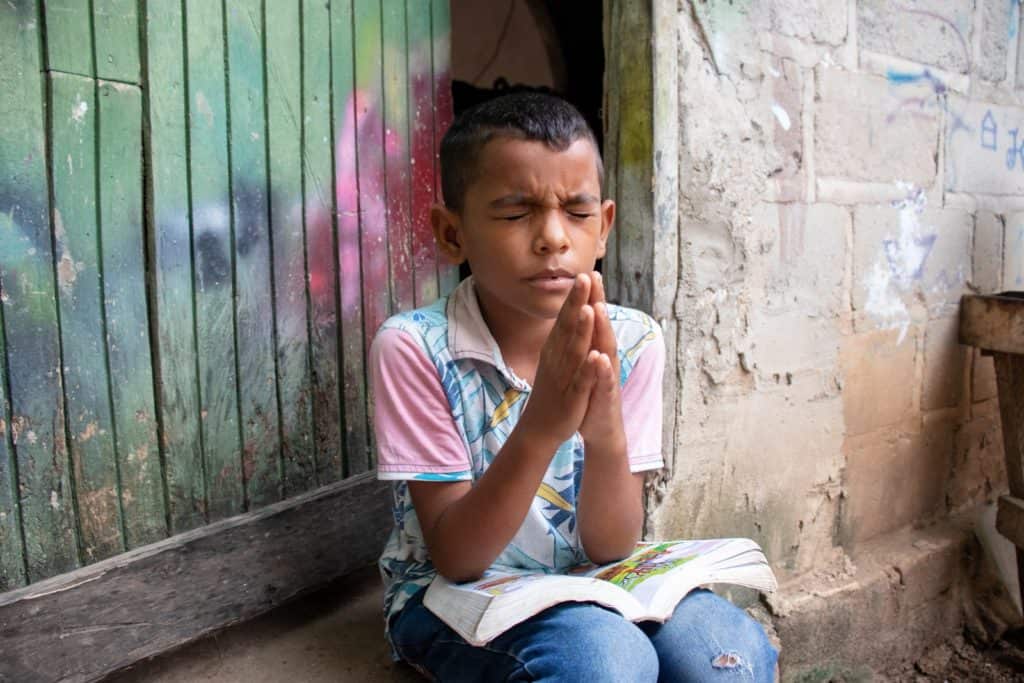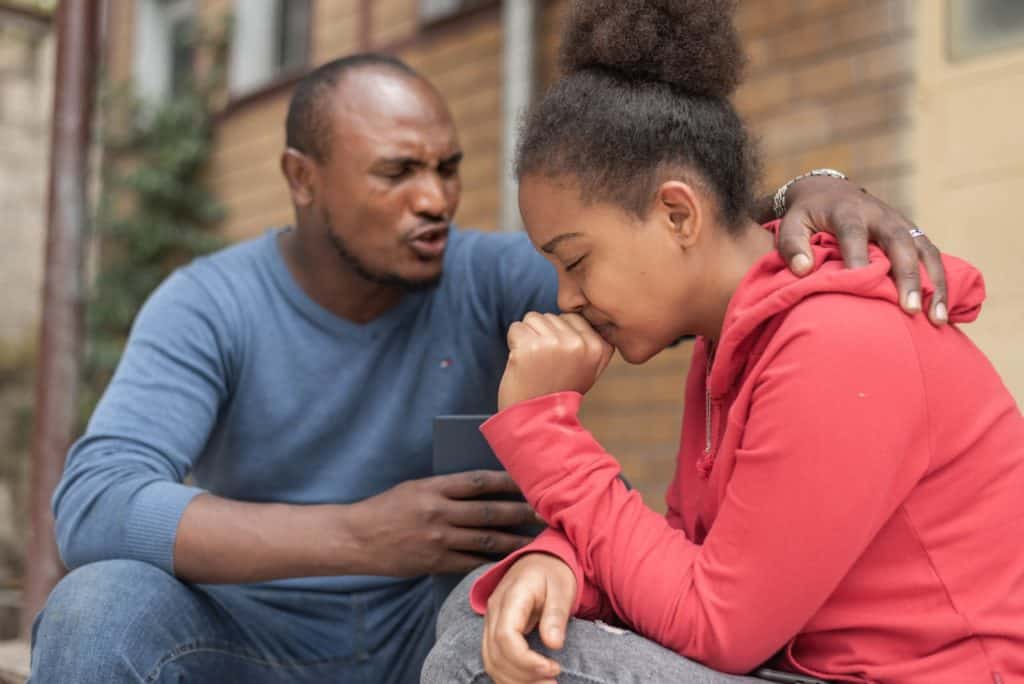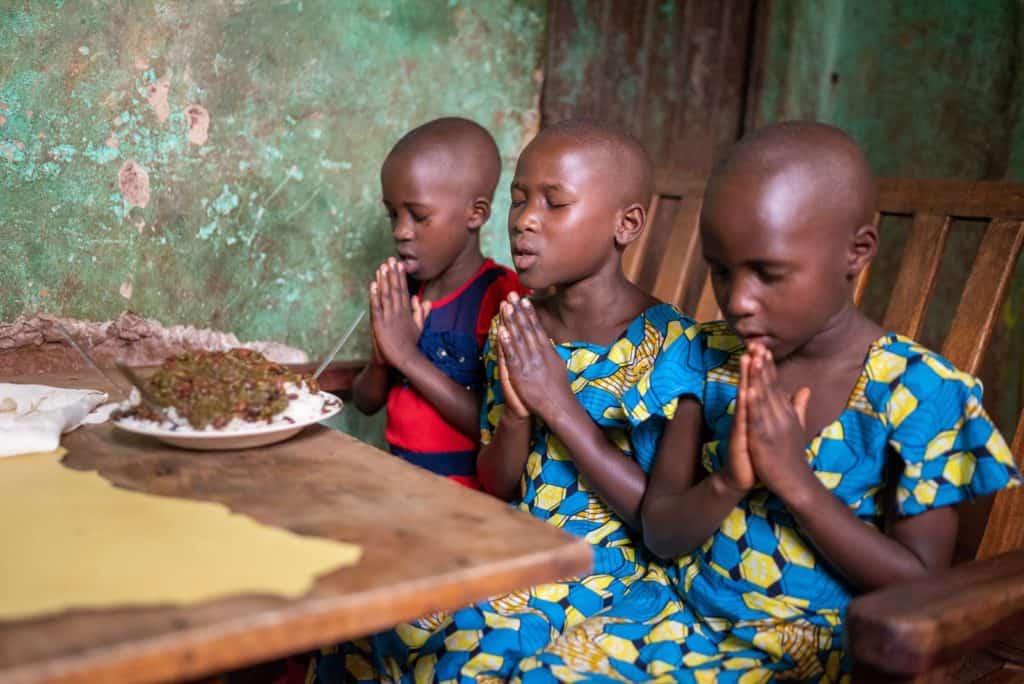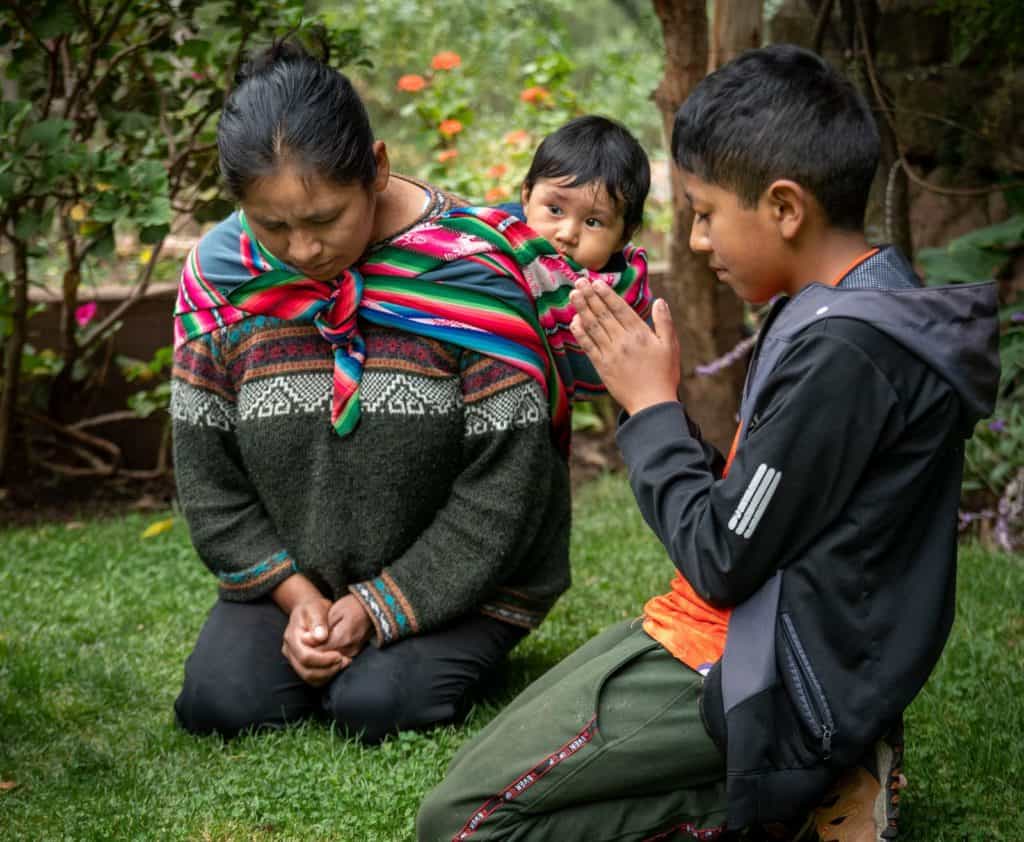
What Is Prayer?
Prayer can be defined simply as a conversation with God. The word “prayer” evolved from the Latin precaria (the feminine form of precarius), meaning to entreat, beg or ask earnestly. This sacred dialogue between God and his children is an important part of most major religions.
In the Christian faith, there are many prayer traditions and types of prayers. Perspectives on where, when and how to pray vary by denomination and culture and liturgical tradition.
As a Christ-centered ministry, Jesus’ life and teachings shape our programs, reflect the spiritual commitments of our staff and guide how we love people, respect communities and cooperate with nations — and this involves a lot of prayer.
Prayer is an integral part of our programs and work. Children attending Compassion-assisted child development centers at their local churches learn to pray as part of the activities. We encourage sponsors to pray for the children they support. And Compassion employees devote regular time to praying for children in poverty and the churches that care for them around the world.

Here’s what the Bible says about prayer and why we believe prayer is so important.
Why Do People Pray?
People of many faith traditions pray. Even people who don’t practice a religion or who don’t consider themselves spiritual will lift up prayers to God in times of great need, fear, desire or difficulty. Most people sense that there’s a higher power — some significant force holding the universe together. So it makes sense that we seek comfort, intercession or answers from that higher power when faced with situations beyond human control.
For Christians, prayer is an essential act that draws us closer to the will of God.
Why Do Christians Pray?
First, we pray because God told us to.
Do not be anxious about anything, but in every situation, by prayer and petition, with thanksgiving, present your requests to God. And the peace of God, which transcends all understanding, will guard your hearts and your minds in Christ Jesus. (Philippians 4:6-7 NIV)
Second, we pray because Jesus prayed. Christians are called to follow the example of our Lord Jesus Christ. And the Gospels — especially the books of Mark and Luke — include many instances of Jesus praying.
Now in the morning, having risen a long while before daylight, He went out and departed to a solitary place; and there he prayed. (Mark 1:35 NKJV)
Jesus prayed in many places — in the wilderness, at his baptism, in the mountains, in the Garden of Gesthemane and on the cross. He prayed for many reasons — to thank his Father, to resist temptation (Matthew 4:1-11), to glorify God and to request forgiveness of others (Luke 23:34).
In Matthew 6:5-15, Jesus gave instructions on how to pray and what to avoid. He told his disciples to find privacy and speak directly to the Father. He said not to be like “the hypocrites” who pray in public only to be seen by others. This passage is where he modeled how to pray in what came to be called the Lord’s Prayer.
Besides wanting to obey God and follow Jesus’ example, here are some other reasons why people pray:
To praise and adore God. We should pray to thank God for answering previous prayers, for always being present in our struggles and joys, for sending his Son, Jesus Christ, to redeem humans from sin, for being who he is … and for the countless other reasons he deserves praise and gratitude.
Because we can. Jesus removed the barrier between us and God. It’s an incredible privilege to be able to pray and have dialogue with God. And even though God knows what we’re going to ask before we ask it, he still encourages us to come to him. Communing with him benefits us. Some effects of prayer are feeling inner peace, worrying less and walking in God’s ways, and it keeps us focused on the big picture — Jesus’ redemption of humanity.
To ask for what we want and need. “If you abide in Me, and My words abide in you, you will ask what you desire” (John 15:7 NKJV). Whether we are asking for provision of basic needs, for something our heart desires, for strength in difficult times or for peace in our lives and our world, God wants to hear what we desire. Many people view the act of praying only as a way to ask God for the things they want. But while God does want us to ask him for what we want and need (James 1:5), prayer is a two-way relationship that also involves listening to him.
To listen. When we sit quietly in devotional time with God, we begin to hear him. We don’t hear his voice audibly but as clarity around decisions, inner peace, the desire to fulfill his will and the recognition that we are his beloved.
To develop the spiritual discipline of prayer. Spiritual disciplines are behaviors we practice and strengthen in order to grow closer to God. Author and theologian Donald Whitney says prayer is the second most important spiritual discipline after reading the Bible.
Because God answers.
“Therefore I tell you, whatever you ask for in prayer, believe that you have received it, and it will be yours.” (Mark 11:24 NIV)
How Often Should I Pray?

Since prayer is simply a conversation with God, it doesn’t have to be formal. It might seem daunting to read in 1 Thessalonians that we should “pray continually.” But considering that it can be done while washing dishes, walking the dog or lying in bed, it becomes a lot more practical.
It’s true that prayer comes to us most naturally in times of trouble. But we can train our minds and hearts for daily prayer. If we can make a habit of prayer, soon it will be second nature to talk to God continually throughout the day.
Still, that doesn’t mean there isn’t value in setting aside a special time and place devoted to praying. Perhaps you close your bedroom door for morning prayers. Or you take a solitary walk after dinner for evening prayers. No matter how, when or where you choose to do it, God will hear you!
Does God Answer Prayers?
“If you remain in me and my words remain in you, ask whatever you wish, and it will be done for you.” (John 15:7 NIV)
God hears all prayers (Psalm 55:16-17). The Bible says he answers every true petition. If our prayers are inconsistent with his will, purpose or plan, then he won’t answer the prayer in the way we had hoped.
It’s often said that God answers all prayers, either with “yes,” “no” or “wait.” If we find ourselves feeling frustrated with unanswered prayers, then the best prayer to God might be asking him to align our will with his.
Types of Prayer
Some Christians categorize prayer into four types: adoration, confession, thanksgiving and supplication. The acrostic ACTS reminds us of these forms of prayer and the order in which to pray them:
- A for “adoration” — prayers of praise. The psalms include many examples of adoration prayers.
- C for “confession” — prayers of repentance. With this type of prayer, we confess our sins and ask for forgiveness.
- T for “thanksgiving” — prayers of gratitude. We take time to thank God for his faithfulness and love.
- S for “supplication” — requests. We should always begin with a humble heart when we ask God to meet our requests. Common prayers of supplication include asking God for:
- Healing.
- Provision of basic needs.
- The desires of our hearts (Psalm 20:4).
- Clarity when making decisions.
- Faith.
- Strength.
- Peace.
Another type of prayer is one of intercession. Intercessory prayer is when we pray for one another. Jesus often prayed on behalf of others. In John 17, he prayed for his disciples and all those who believed his message.
The Bible tells us that the Holy Spirit is our intercessor. “And he who searches our hearts knows the mind of the Spirit, because the Spirit intercedes for God’s people in accordance with the will of God” (Romans 8:27). It’s amazing to know that the Holy Spirit brings requests to the Father on our behalf.
Compassion sponsors and employees pray many prayers of intercession. We frequently and humbly plead with God to:
- End poverty.
- Provide children with food and safe water.
- Protect children from abuse and exploitation.
- Equip churches around the world to speak hope and truth into the lives of children living in desperate circumstances.

A litany is another type of prayer. It is used in services and processions at some churches. It calls on the mercy of Jesus Christ for a variety of petitions.
Many other forms of prayers can be found in liturgical services. Liturgy is a rite or rites prescribed for public worship. Specifically, liturgy usually relates to Eucharistic practices — those meant for communion with God. In church services — especially in the Anglican church — liturgical prayers are often practiced as a call and response between a pastor and congregation. It’s a way to more actively include congregants in communal prayers. Liturgy can also help develop more discipline in prayer. Common liturgical practices include the Lord’s Prayer (“Our Father”), Lectio Divina and the Liturgy of the Hours and sacraments from the Book of Common Prayer.
Famous Prayers
So what are some good prayers? Here are a few famous prayers to use as inspiration.
The Lord’s Prayer
The Lord’s Prayer is one Jesus shared with his disciples:
“This, then, is how you should pray:
‘Our Father in heaven,
hallowed be your name,
your kingdom come,
your will be done,
on earth as it is in heaven.
Give us today our daily bread.
And forgive us our debts,
as we also have forgiven our debtors.
And lead us not into temptation,
but deliver us from the evil one.’”
(Matthew 6:9-13 NIV)
The Serenity Prayer
This famous prayer has evolved over the years. It was likely written in the early- to mid-20th century and is most commonly attributed to American theologian Dr. Reinhold Niebuhr.
This is the current version used by churches and 12-step programs like Alcoholics Anonymous:
God, grant me the serenity to accept the things I cannot change,
courage to change the things I can,
and wisdom to know the difference.
The Sinner’s Prayer
“The sinner’s prayer” refers to any prayer of repentance. Here are a couple of sinner’s prayers from famous ministers:
Dear heavenly Father, I know that I am a sinner, and I ask for your forgiveness. I believe you died for my sins and rose from the dead. I turn from my sins. I repent of my sins. I invite you to come into my heart and life. I want to trust and follow you as my Lord and Savior. In Jesus’ name, amen.
— The Rev. Billy Graham
Our Holy Father, we confess the weakness and sinfulness of our lives. We have often turned away from thee to seek our own desires. And often when we have done no evil, we have undertaken nothing of good, and so have been guilty of uselessness and neglect. From this sin of idleness and indifference set us free. Lead us into fruitful effort, and deliver us from profitless lives. We ask in the name of Jesus. Amen.
— The Rev. Martin Luther King Jr.
Liturgical Prayers
Lectio Divina: A structure for prayer consisting of four steps: lectio (reading), oratio (praying), meditatio (meditation) and contemplatio (contemplating).
Daily Examen: A prayer technique practiced by St. Ignatius that invites reflection on the day. It has five steps: become aware of God’s presence, review your day with gratitude, pray about one aspect of your day, pay attention to your emotions and look toward tomorrow.
The Liturgy of the Hours: Mostly made up of psalms, hymns and chants, this public prayer discipline follows a four-week cycle. It’s prayed at specific times, or “hours,” of the day and is a way for the Church to praise God and bless his people.
Grace (Before-Meal Prayers)
So whether you eat or drink or whatever you do, do it all for the glory of God. (1 Corinthians 10:31 NIV)
People of many faiths say prayers of thanksgiving before eating. Here are some common ways Christians say grace. They vary by denomination, faith tradition and family:
Come, Lord Jesus, be our guest
And bless what you have bestowed.

For what we are about to receive
may the Lord make us truly thankful. Amen.
Bless us, oh Lord,
and these, thy gifts, which we are about to receive from thy bounty.
Through Christ our Lord. Amen.
Oh, God, when I have food
help me to remember the hungry;
when I have work, help me
to remember the jobless;
when I have a warm home,
help me to remember the homeless;
when I am without pain,
help me to remember those who suffer;
and remembering, help me
to destroy my complacency
and bestir my compassion.
Make me concerned enough
to help, by word and deed,
those who cry out
for what we take for granted.
— The Rev. Samuel F. Pugh
Bedtime Prayers for Kids
There are many variations of easy-to-remember bedtime prayers for children. Here are a couple of rhymes to help kids develop a strong personal prayer life from an early age:
Now I lay me down to sleep.
I pray the Lord my soul to keep.
May God guard me through the night,
And wake me with the morning’s light. Amen.
Thank you, God, for the world so sweet;
thank you, God, for the food we eat;
thank you, God, for the birds that sing;
thank you, God, for everything!
Lord in heaven, hear my prayer;
keep me in your loving care.
Be my guide in all I do.
Bless all those who love me, too.
What Does ‘Amen’ Mean?
“Amen” is translated from a Hebrew word that literally means “truly” or “so be it.” It is often said at the end of prayers as a way of saying to God, “Please let it be so.” In the New Testament, the writers ended their epistles with “amen.” So we are following their example when we say it.
Bible Verses About Prayer

From the New International Version:
“But I tell you, love your enemies and pray for those who persecute you.” (Matthew 5:44)
Rejoice always, pray continually, give thanks in all circumstances; for this is God’s will for you in Christ Jesus. (1 Thessalonians 5:16-18)
In the same way, the Spirit helps us in our weakness. We do not know what we ought to pray for, but the Spirit himself intercedes for us through wordless groans. (Romans 8:26)
Be joyful in hope, patient in affliction, faithful in prayer. (Romans 12:12)
“Call to me and I will answer you and tell you great and unsearchable things you do not know.” (Jeremiah 33:3)
Praise be to God, who has not rejected my prayer or withheld his love from me! (Psalm 66:20)
The LORD said to him: “I have heard the prayer and plea you have made before me.” (1 Kings 9:3)
Isaac prayed to the LORD on behalf of his wife, because she was childless. The LORD answered his prayer, and his wife Rebekah became pregnant.” (Genesis 25:21)
Hear my prayer, LORD, listen to my cry to help. (Psalm 39:12)
“If you believe, you will receive whatever you ask for in prayer.” (Matthew 21:22)
During the days of Jesus’ life on earth, he offered up prayers and petitions with fervent cries and tears to the one who could save him from death, and he was heard because of his reverent submission. (Hebrews 5:7)
Quotes About Prayer
“Prayer is the God-given communication link between heaven and earth, time and eternity, the finite and the infinite.”
— Tony Evans
“If prayer leads us into a deeper unity with the compassionate Christ, it will always give rise to concrete acts of service.” — Henri Nouwen
“Prayer is a gift. It is an opportunity to connect with God, to be told what we don’t know.” — Annie F. Downs
“When prayer is long in the answering it will be all the sweeter in the receiving, like fruit which is well ripened by hanging longer on the tree.” — Charles Spurgeon
“Prayer is spiritual communication between man and God, a two-way relationship in which man should not only talk to God but also listen to Him.” — Billy Graham
“Real prayer isn’t about changing God’s mind, but about finding God’s heart, and letting his heart change our minds.” — Ann Voskamp
“It is not so true that ‘prayer changes things’ as that prayer changes me and I change things.”
— Oswald Chambers
“There is incredible power in the prayer of a child.” — Santiago “Jimmy” Mellado
“Prayer is how we align our hearts with God and when we receive his promptings.” — Barb Roose
“The power of prayer is not based on the one who says it but on the one who hears it. Don’t wait to be perfect to pray.” — Kirk Franklin
“Our prayers may be awkward. Our attempts may be feeble. But since the power of prayer is in the one who hears it and not the one who says it, our prayers do make a difference.” — Max Lucado
When Is the National Day of Prayer?
The United Stages Congress has set aside the first Thursday of May as the National Day of Prayer. It’s a powerful day to call upon the Lord on behalf of the whole U.S.
At Compassion we mark the National Day of Prayer by praying for our country. We also pray for the countries where we work with local churches to release children from poverty in Jesus’ name. Join us in prayer for our nation, other nations, the leaders of the world and God’s churches. And sign up to receive our monthly prayer calendar to pray with us for the needs of children living in poverty.
A Prayer for Our Nation
Lord, thank you for giving me the privilege of living where I do. Please intervene in the areas of this country that so desperately need you. Where there is conflict, bring peace. Where there is division, bring unity. Where there is hate, bring love. Where there is poverty, bring relief. Please move in miraculous ways.
A Prayer for Other Nations
Dear God, I praise you for creating a world full of beauty, diversity and different places. Today I pray specifically for the countries where Compassion-sponsored children live. Pour out your love, protection and wisdom onto the nations. Protect those who are forgotten, oppressed, victims of natural disasters and living in poverty. Overwhelm each country with your presence.
A Prayer for Leaders in the U.S.
Dear God, please be with the people who hold positions of leadership in this country – in government, in communities, in local churches, in schools, in homes. Provide leaders wisdom, discernment and humility. Give them the opportunities to be protectors, advocates and beacons of positive change. Guide their path so that they may lead others well.
A Prayer for Leaders Around the World
Lord, today I pray for the leaders in the countries where Compassion works. Empower government leaders, local leaders, pastors, teachers and parents to guide with wisdom, love and passion. Equip them with the materials and knowledge they need to bring positive change to their circles. Give them hearts to remember, care for and protect children living in poverty within their community.
A Prayer for Churches in This Country
Lord, thank you for the local church. Thank you that we can worship you freely in this country. Today I pray that the thousands of churches scattered across this country would serve as beacons of light, hope and peace. May they bring hope to their communities by caring for the poor, inviting people in and serving as examples of the unconditional love of Jesus.
A Prayer for Churches in Other Countries
Dear God, thank you for local churches all around the world. I pray specifically for the churches Compassion partners with. May they be places of safety, refuge and hope. Help them to meet the specific needs of their communities. Continue to equip them to care for children well. May local churches across the globe change the world for your glory.
In the name of Jesus, amen!
Praying for Children

Prayer is a powerful and important conversation with God. For children in poverty who continually face hunger, disease and disaster, prayer is a lifeline. They recognize that even if there is no one else to turn to, they can turn to God, who will hear their prayers. The act of prayer gives children in poverty hope that things will change.
Join us in praying for children who live in poverty by signing up to receive our monthly prayer calendar. It includes requests sent to us by Compassion staff around the world on behalf of the children in our program. You will receive it in an email that also includes inspiring updates about how your prayers make a difference in the lives of children!
Photography by Vera Aurima, Tigist Gizachew, Lina Marcela Alarcón Molina, Juana Ordonez Martinez, Fernando Sinacay and Doreen Umutesi.
SOURCES: The Holy Bible (New International Version), Billy Graham Evangelistic Association, Ligonier Ministries, Got Questions, The Martin Luther King, Jr. Research and Education Institute, cslewis.com.







6 Comments |Add a comment
WHERE IS THE OCTOBER 2022 CALENDAR FOR PRAYER PLEASE??
Hello there! Thank you so much for bringing this to our attention. I’m so sorry the prayer calendar has not been updated to October yet. We are looking into this further to see when it will be posted. Once we find out, we will contact you via email. Thank you and God bless!
Hola. donde puedo pedir ayuda de oracion para mi??
Hola Karina. Le invitamos a enviar un correo electrónico a socialmedia@compassion.com con sus peticiones de oración. ¡Estamos felices de orar contigo!
This is to inform you that we are a church under the name Church Power Restoration International Ministries .
Among our ministries we have Orphans, who are depending on us .
Financially,spiritually and health wise as you know , COVID-19 has been a big blow to many activities and poject around world thus .We were not spared ,we got seriously affected by the pandemic that we can’t come efficiently to the needs of our beloved orphans.
It is then in this regard that we are coming to you for assistance help and support .
We are with great hope that you’ll give us support to get our children’s need met and become one of our partner .
Waiting to hear from you very soon ,we with you all the best in the mighty name of Jesus Christ our lord and savior
You’re faithful
Pastor Elijah Mugisho
Tel +254701172113
Hello Pastor Elijah! We are sorry to hear of the many struggles you have endured during this pandemic and the impact it has made on your ministry. We greatly appreciate your desire to help the children in your community. Please email us at socialmedia@compassion.com to learn more about partnering with Compassion International. We look forward to hearing from you. God bless you!